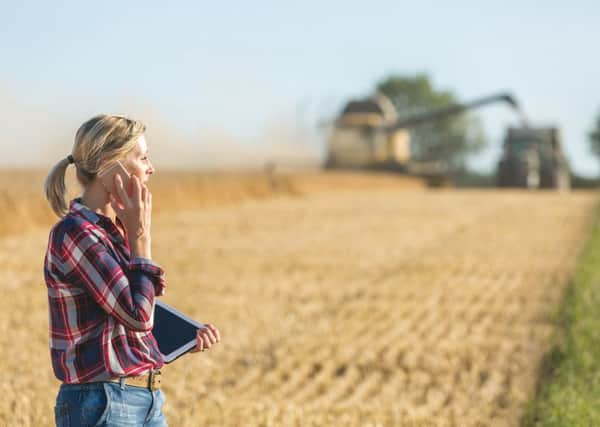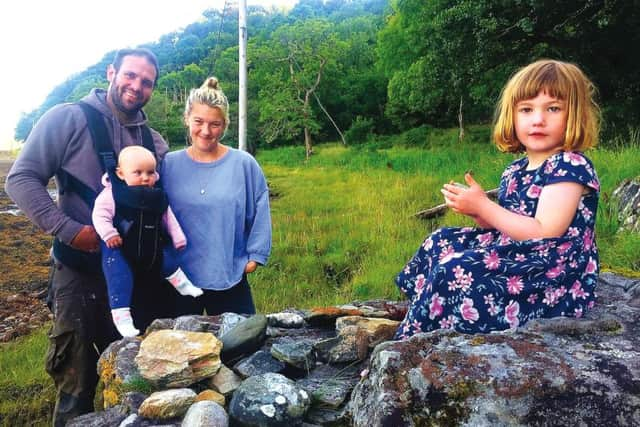Practice of passing on farm to son is biggest barrier to women entering agriculture


But increasingly women are heading farm businesses and can be found in important roles in the wider agricultural sector.
The necessity of diversification has brought many women to the fore as farms extend their business beyond livestock or arable management and, in smaller family firms, a woman’s off-farm earnings are often vital for cash flow.
But this involvement is sometimes not reflected in representation, particularly at higher levels and with a UK-wide drive towards gender parity in the leadership of both public and private companies, the sector’s shortfall has been highlighted.


In 2017, the Scottish Government’s Rural and Environment Science and Analytical Services Division (RESAS) published research investigating the role of women in farming and the agriculture sector in Scotland. The report’s conclusions found that farming is an occupation with gender inequalities in access to land, participation in farming organisations, and education and training.
The cultural practice of passing on large farms intact to one son is the single biggest barrier to women’s entry into agriculture, but women are also under-represented amongst the elected leadership of national-level farming organisations – and some respondents reported exclusionary practices that were harmful to women’s advancement.
In Scotland, a Women in Agriculture task force was set up and is due to report its progress this coming autumn.
Nina Clancy, chief executive of the Royal Scottish Agricultural Benevolent Institution, serves on the task force and says: “For two years we have been looking at the recommendations made and the measures that could be introduced by the industry, the government and women themselves to help.
“Under-representation of women in leadership organisations is caused by a combination of bias, mostly unconscious, on behalf of the organisation, and some confidence issues in the women which causes them to not put themselves forward for roles.
“We aren’t about positive quotas but there are eminently qualified women so we are running training programmes to boost confidence. The research shows that women do already take a full role in every aspect of agriculture, from hands-on farming, marketing, research, sales and insurance, but quite often their voices aren’t heard.
“If we can change that, we as an industry are going to be far more inclusive, innovative, successful and frankly, more modern. We would have a better industry to cope with the future.”
Gemma Cooper, head of policy at the National Farmers Union Scotland (NFUS), which has come under scrutiny for its lack of women at board level, says: “The perception is that women play a secondary role in the industry, but I think that has always been the perception of the wider public rather than the reality.
“There has been a spotlight shone on the industry because of legal changes such as last year’s Gender Representation on Public Boards act. So that has sparked a wider conversation about the diversity in farming organisations and in some respects the industry has lagged behind others in terms of leadership. It is still male-dominated but there are women who are starting to come to the fore.”
She says that while there are women who head farms in their own right, diversification on a traditional farm can often be a very female-led domain. “The majority of diversification that I am aware of is driven by women who bring added value and experience,” adds Cooper. “Succession is a very important part of the conversation but it is not just about gender, as younger sons can also be left out if a farm is passed on intact.”
Of the agricultural careers found across the farming sector, some are certainly still male-dominated. Cooper notes: “Auctioneers still tend to be men while in veterinary practices, traditionally men specialise in large animals.”
But she says some of these supporting industries are male-dominated because they are seen as a natural career path for second sons.
“Other associated industries do have more gender parity. Agricultural law, rural law, estate management and land agency are all just about a 50-50 split. The policy team at NFUS also has gender parity.”
Of the problems women face in the industry, Cooper says: “I don’t think there is a clamour of women who want to get into farming who are being denied access, but there are women in farming who want to have more of a voice.
“And it can be old-school – there are prize-giving events for agricultural shows held at men-only dinners for example, and we need to recognise that this needs to change. The industry is hugely driven by technology now, it is undoubtedly hard work but I don’t think there are any jobs that a woman couldn’t do.”
Aylett Roan runs Barnbarroch Farm in south-west Scotland with her husband. After graduating from agricultural college, she worked in various parts of the industry so brings a wealth of experience to the dairy farm. She is also part of the Women in Agriculture group (which existed before the Women in Agriculture task force was set up to promote networking and offer courses to women in rural industries).
“At first I thought that we didn’t need extra support,” says Roan. “I’ve been very fortunate in my farming career, if I wanted to do something I’ve just done it, but I have come to realise that has a lot to do with the support of the people around me.
“Events and courses have to be meaningful, because many of us have to take a day off work to travel to them. I joined the committee to try and put forward the point of view of people actually on the ground.
“Women are under-represented on boards, but I think sometimes we are just too busy – with different projects, childcare or outside work. If we are the sole person on the farm, we aren’t going to be attending networking meetings, we don’t have the time.”
But she believes there are more modern ways to have an opinion heard.
“Women are now becoming more visible because of social media – certainly there are some strong characters who are very vocal. This is where social media can really connect people.
“All people involved in farming can benefit from more communication – things like the rural leadership courses are an excellent way to not just learn but to cross paths with other parts of the industry.”
Nina Clancy says the industry may lag behind in terms of gender parity but things are changing. “Research shows that new entrants are more equal,” she says. “When you get a new couple coming into farming they do tend to make decisions and share out tasks much more evenly than someone marrying in.
“A lot of sisters, daughters and wives work in other industries but apply their skillset back in the family business which can boost efficiency.
“Women bring a lot to the table, but there are still some who are being ignored or whose skills are being underutilised.”
A full-on family affair
Nikki Brown might not seem to be typical of women working in agriculture, but her story – of bringing unique skills and experience to extend the scope of a traditional farm – is becoming more common in rural businesses.
A graduate of St Andrews University, she was working as a PR in the technology sector down in Surrey where she had spent her childhood, before relocating, in 2012, with her husband, Fraser, to Shellfield Farm in Argyll, taking over from his uncle and aunt as fourth-generation farmers.
Nikki says: “My background is in marketing, and initially I took a job for a local charity, Kilfinan Community Forest, firstly in administration and then moving into business development.”
Up until then, the farm had been traditionally run, with lambs and calves sold as stores. She recalls: “Finances were tight – we knew we would have to diversify – and my business background helped us to plan.
“My expertise is in streamlining the business, investigating funding and spotting growth opportunities, where Fraser is in charge of animal husbandry and the day-to-day running of the farm.”
The couple installed a hydro-electric scheme in 2016 which stabilised their income. Nikki explains: “Previously we would be paid three times a year, for lambs, calves and the subsidy, but each payment was subject to fluctuations.” And, pursuing her passion for cooking, the couple have recently built a commercial kitchen and butchery by their farmhouse.The plan is to extend their outside catering business, which already sells salt marsh lamb and beef to local restaurants and burgers and roasts at festivals such as Belladrum and the Scottish Game Fair.
Both Fraser and Nikki now work full-time in the business, and have two daughters, Elsie, three, and eight-month-old Betty.
Nikki says: “We hope to continue to grow the business and be able to put something back into the local economy by taking on trainees in butchery and in the kitchen, and to create a profitable business that can be passed on to our daughters.”
This article first appeared in The Scotsman’s autumn Vision magazine. A digital version can be found here.